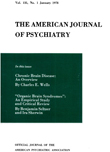Levoamphetamine and Dextroamphetamine: Differential Effect on Aggression and Hyperkinesis in Children and Dogs
Abstract
In laboratory experiments with hyperkinetic, untrainable dogs and in a comparison of levoamphetamine, dextroamphetamine, and placebo in children, levoamphetamine and dextroamphetamine were found to be approximately equal in calming an aggressive, hostile dog and in benefiting "unsocialized-aggressive" children: dextroamphetamine was more effective than levoamphetamine in calming "nervousness" and hyperactivity in dogs and in overanxious-hyperkinetic children. These data suggest that in the hyperkinetic syndrome, aggression and hostility may be benefited equally by levoamphetamine or dextroamphetamine via a dopaminergic mechanism, while anxiety and overactivity may be benefited significantly only by the dextro isomer via a norepinephrinergic mechanism.
Access content
To read the fulltext, please use one of the options below to sign in or purchase access.- Personal login
- Institutional Login
- Sign in via OpenAthens
- Register for access
-
Please login/register if you wish to pair your device and check access availability.
Not a subscriber?
PsychiatryOnline subscription options offer access to the DSM-5 library, books, journals, CME, and patient resources. This all-in-one virtual library provides psychiatrists and mental health professionals with key resources for diagnosis, treatment, research, and professional development.
Need more help? PsychiatryOnline Customer Service may be reached by emailing [email protected] or by calling 800-368-5777 (in the U.S.) or 703-907-7322 (outside the U.S.).



